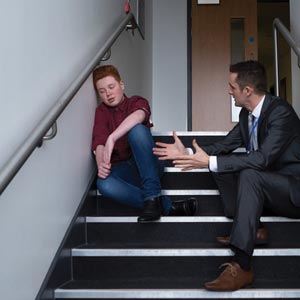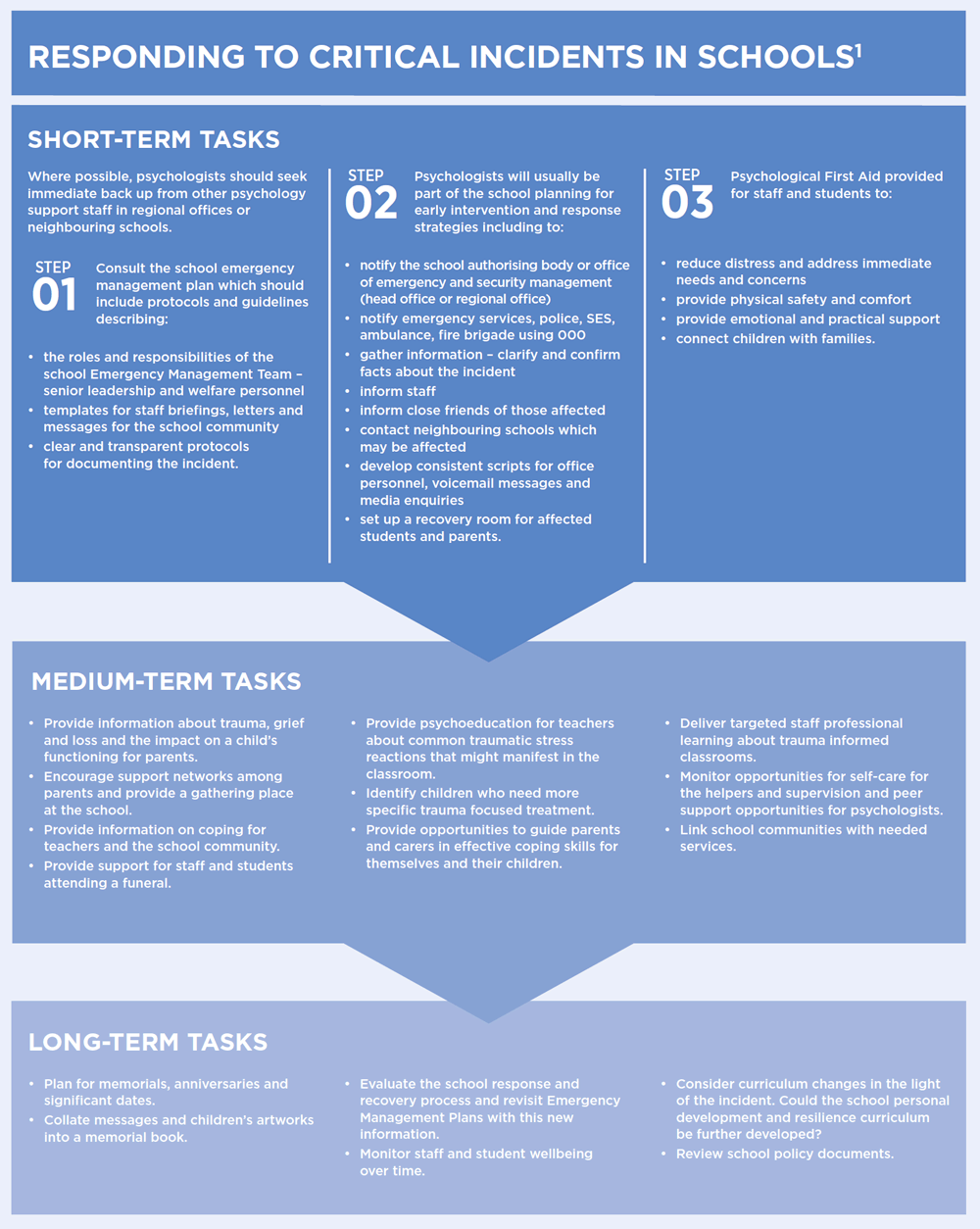In October 2016 a family of four was found dead in their Sydney home in an apparent murder-suicide. The psychologist involved in the school response was a recent graduate contracted to fill a maternity-leave position at the school for only a year while completing a registrar program under the supervision of Dr Gary Banks. In this article, Anna details the impact on the school community, the actions she and others took to support those affected, and the learnings for her as an early-career psychologist.
Psychologists are often front and centre as part of the response when traumatic events occur. In schools, principals, teachers and parents look to the school psychologist for help in a crisis. This responsibility can be challenging and often overwhelming for even the most experienced psychologist, yet paradoxically is a task that is difficult to refer on, even for young psychologists, as it is the essence of the role. It is important in this context that psychologists acknowledge and attend to their own distress including seeking support and adopting self-care strategies.
It was 10.30am on Monday 17 of October 2016. Maria Lutz had not arrived for canteen duty and her children had not arrived at school. Despite numerous phone calls and text messages, no one could get in touch with them and it was uncharacteristic of Maria not to inform the school of an absence. The school contacted the police to request a welfare check, and they subsequently sent a car to the house. The leadership team was on standby; we were all anticipating that something terrible had happened. At 11.30am the Deputy Principal came into my office, I could see her eyes were red from crying. She paused for a moment and then spoke the inconceivable truth “It’s all of them, they are all dead”.
As a new graduate of the Masters of Psychology (Clinical) program my first year at a Catholic primary school for children with disabilities was an intense learning curve. The school psychologist’s role at the school is somewhat different from working in a mainstream school. We work closely with the teachers and teacher aides implementing behavioural support for children with challenging behaviours, undertaking cognitive assessment to assist in providing therapeutic interventions which will support teachers to develop individual education plans, and providing advice and support to teachers. Each teacher works in difficult circumstances, frequently exposed to stressful situations and managing up to 10 students in each classroom with different and often complex needs.
The school psychologist is required to be competent in assessing and identifying families ‘at risk’. Many of the parents have limited external support to deal with the complexities of their child’s disability and are often under high levels of stress. At the school, family support is a fundamental component of the school culture, with much of the support facilitated through the mothers of the children who attend the school. In this case the mother was actively engaged with the school providing support to other families and participating in volunteer activities. She was, therefore, well-known to many. Both parents had migrated from Colombia and were raising two children (who both had a diagnosis of autism and intellectual disability) without extended family support. In addition to their disability, both children had a range of complex medical needs. Even though we identified this family as having complex medical and disability needs, at this time they were not considered to be at risk.
Initial crisis response
As news of the tragedy unfolded the leadership team immediately implemented the school’s crisis plan. My role as the school psychologist was to provide guidance and advice to the leadership team. The crisis plan provided a logical step-by-step process with regard to the roles and duties of members in the leadership team including who to contact, when and how to inform staff and families, and services to be offered in the days and months following the event. I had responsibility for the psychological support provided to the students, families and staff – though as it turned out, in reverse order. This was largely a coordinating role although I was also involved in providing some of the one-to-one trauma counselling.
Part of my responsibility was to work directly with the Principal to develop an appropriate communication strategy to inform, initially school staff, and then parents and students. It was important that all communication provided a consistent message, used appropriate language and was sensitive to the grief and loss that the various recipients would be experiencing as well as taking account of different levels of understanding of the event. Unfortunately, time was against us with the media at the school gates within an hour of the school being informed of the deaths. In this context it was decided that those who had direct contact with the family be told first, and then the remaining staff brought together and briefed. An email was then sent to all parents to inform them of the tragedy.
Facilitating support and counselling was a priority. In the first 24 hours we had access to external psychologists through the Employee Assistance Program but as word spread a number of the psychologists working in schools in the North Shore area approached the school to offer their support and we were able to bring them in from day two to assist with the school’s counselling needs. As parents were coming to the reception area in distress, having extra counsellors on-site allowed us to have parents immediately seen as they presented to the school. During the first two weeks following the tragedy, up to five psychologists were on-site each day supporting staff and parents. Pastoral care assistance was also provided to individuals who wished to speak with a member of the church. The psychologists phoned each family from the school as a ‘check in’ as we were aware that many of them could not come to the school and access psychological support. We wanted to ensure that every family had the opportunity to talk to someone about what had happened.
In addition to the one-on-one counselling that was provided, resource packages were developed and sent to all families with information on grief and loss and how to support a child with a disability through the grief process. Support sessions were provided in the evenings for both staff and parents during the first week following the incident. This gave the staff and parents the opportunity to come together and talk about their grief. They were also provided with psychoeducation about grief, loss and trauma. Towards the end of the first week it became known that the father had been responsible for the deaths and this required a refocus to address any repercussions, including guilt, experienced by those who had been in direct contact with the family. Additional strategies were then implemented to directly communicate with and support all the fathers in the school community.
In focusing on the students, including many with severe intellectual impairments, we were mindful of not overwhelming them with information they might struggle to understand. A ‘script’ was created and distributed to staff and parents so there was a consistent message in clear language to help students understand that their friends had died and would not be returning to school. A social story was also created to reinforce the information, in particular for those children identified as being most impacted by the deaths due to their close friendship with the children or their frequent contact with the children’s mother as a volunteer. In addition, children who were higher functioning and hence had a better understanding of the events were identified as being at high risk.
Information was provided to teachers to help them monitor children that might be vulnerable. This was challenging for teachers given that many of the students had complex communication needs and could not articulate their emotions. Teachers were trained to look for signs of anxiety, irritability and restlessness as well as to listen to those students that were verbalising distress. The teachers were able to use the social story with vulnerable students and refer for psychological intervention where necessary.

The recovery process
In the week following the event the school leadership team identified the need for the community to come together and share their experiences of loss. A memorial was organised for the Friday of that week and more than 300 people attended. Smaller events were also held at three and six months to commemorate the tragedy. In addition, the school dedicated an art studio to the children who died and a wooden bench crafted with mosaic ornaments designed by her closest friends, placed in a selected part of the school gardens, was made and dedicated to their mother.
As part of the recovery process, psychoeducation was provided to staff and parents about the recovery pathway after trauma and the importance of self-care in recovery. Wellbeing days and weeks were created each term to remind staff to look after themselves and each other. Mindfulness and CBT groups were developed for both the staff and parents, in collaboration with the Australian College of Applied Psychology (ACAP) where I had completed my training. The School of Psychological Sciences at ACAP provided postgraduate-level psychology students to help facilitate the groups that were received very positively by staff and parents.
In addition to these measures, the Principal started a men’s group for the fathers and grandfathers in the school and the local community to help support them during this time. This group continues to meet once a term and give the men an outlet to talk about their difficulties as parents of children with profound disabilities and their own response to the tragedy.
Reflections and learning
From this sad and difficult experience there has been considerable growth and learning. Although at times it seemed that I was working in automatic mode, there was a framework that guided activities and various people who assisted enormously in shared decision-making and working through the everyday tasks. Collaborating with the leadership team to make decisions on how to work through the critical incident action plan was essential. I was fortunate that we had a very strong team that worked together supporting each other so that all decisions were made collectively rather than individually. Seeking out supervision during the initial days and months following the event became an important part of coping for me. I was able to connect with my supervisor daily over the phone during the first week and in the subsequent weeks I attended weekly supervision until I felt the school was through the initial crisis period. This helped me to focus and draw on my strengths and the skills that were needed such as being process-oriented, multi-tasking, taking a methodical approach and drawing on different communication strategies.
My supervisor also provided me with a space to be vulnerable and to express how the event had affected me. Throughout the initial crisis I felt the enormity of carrying the staff, students and parents without letting my emotions compromise my work and professionalism. Supervision gave me that outlet, but more importantly my supervisor gave me strategies to get through the event, the confidence to take on a leadership role and the space to reflect upon my own emotional response to the situation. This also helped me to allow others to be vulnerable, including those in the leadership team, and to be realistic about the significance of the situation and the inevitable impact of it.
 Connecting with my peers was also very important. I frequently talked to my psychology colleagues and worked closely with the Deputy Principal and the Principal. Together we were able to talk openly about what the school needed and provide feedback to each other in a non-judgemental, respectful way. I was able to assist the Principal to understand the need for clarity of communication, combined with the need for repetition and frequent updates – even when there was no news to release to the school community. More importantly we could let our guard down and express our difficulties and challenges on a daily basis.
Connecting with my peers was also very important. I frequently talked to my psychology colleagues and worked closely with the Deputy Principal and the Principal. Together we were able to talk openly about what the school needed and provide feedback to each other in a non-judgemental, respectful way. I was able to assist the Principal to understand the need for clarity of communication, combined with the need for repetition and frequent updates – even when there was no news to release to the school community. More importantly we could let our guard down and express our difficulties and challenges on a daily basis.
In retrospect, I wish that I had taken the time to seek professional training in responding to a traumatic event. It was only as a result of this tragedy, through speaking to Dr Banks and staff from headspace, that I developed an understanding of how to respond to this event. Many of my decisions and strategies to help others were guided by my limited knowledge about trauma and recovery, shaped by my supervisor’s ready input, but ostensibly based on my own intuition about what needed to happen for this unique community. This tragic event has taught me that even though I was very early in my career, I had many psychology skills to draw on and the personal strength to manage the situation. I was able to experience my resilience and ability to keep calm and controlled in an environment that was completely unpredictable.
“It was important that all communication provided a consistent message, used appropriate language and was sensitive to the grief and loss that the various recipients would be experiencing as well as taking account of different levels of understanding of the event”
